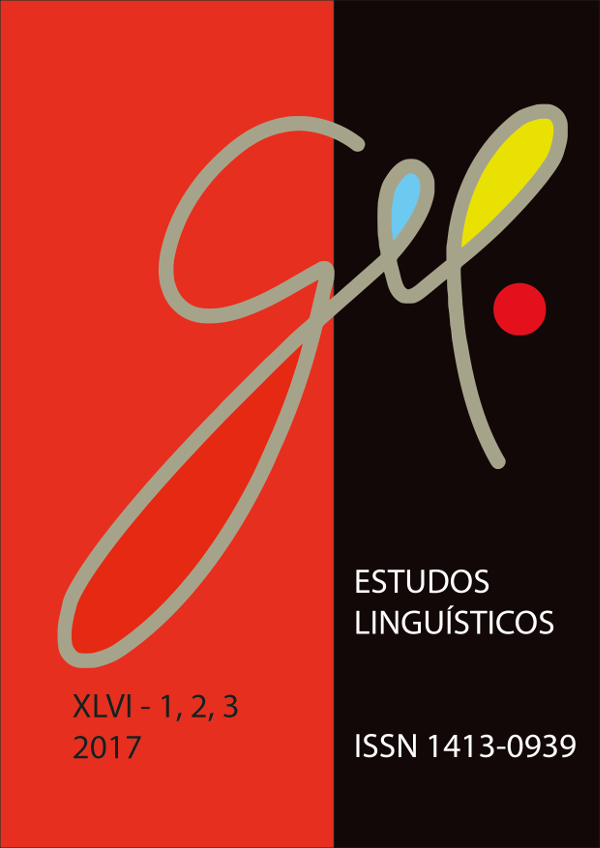The evidential conditional value in journalistic domain
DOI:
https://doi.org/10.21165/el.v46i2.1684Keywords:
evidentiality, functionalism, conditionalAbstract
This paper proposes the study of a type of evidential marker not yet described in Brazilian Portuguese (BP), the conditional tense, which indicates how the speaker had access to the information conveyed in the statement – what is the source of the information. Based on the functionalist theory, it is intended to make a detailed description of the “conditional evidential value” in real contexts of use in BP. Based on occurrences provided by a corpus formed by genres of the journalistic domain, we aim to describe the functioning of this use, looking to set its characteristics. With this characterization, it will be possible to verify if the conditional morpheme can be considered as a way of grammatically marking evidentiality in BP, a process that happens in other languages. This description will enable, besides, the verification of the discursive function of this use in the journalistic genres that compose the corpus.
Downloads
References
AIKHENVALD, A. I. Y. Evidentiality. Oxford: Oxford University Press, 2004.
DALL’AGLIO HATTNHER, M. M. et al. Uma investigação funcionalista da modalidade epistêmica. In: NEVES, M. H. M. (Org.). Descrição do Português: definindo rumos de pesquisa. Araraquara: Cultura Acadêmica, 2001. p. 103-143.
______. Pesquisas em sintaxe: a abordagem funcionalista da evidencialidade. In: MASSINI CAGLIARI, G. et al. (Org.). Trilhas de Mattoso Câmara e outras trilhas: fonologia, morfologia e sintaxe. Araraquara: Cultura Acadêmica, 2007. p. 103-145.
DENDALE, P. Le marquage épistémique de l’énoncé: esquisse d’une théorie avec applications au français. 1991. 383 f. Tese (Doutorado) – Université d’Anvers, Antwerpen, Bélgica.
______. Il serait à Paris en ce moment. Serait-il à Paris? A propos de deux emplois épistémiques du conditionnel. Grammaire, syntaxe, sémantique. In: CASTRO, C. A., BANGO DE LA CAMPA, Fl.; DONAIRE, M. L. Liens linguistiques. Études sur la combinatoire et la hiérarchie des composants. Bern: Peter Lang, 2010. p. 291-317.
DENDALE, P.; TASMOWSKI, L. Présentation. L’évidentialité ou le marquage des sources du savoir. Langue française, Paris, v. 102, p. 3-7, 1994.
______. Introduction: Evidentiality and related notions. Journal of Pragmatics, Amsterdam, v. 33, n. 3, p. 339-348, 2001.
DIK, S. Studies in functional grammar. London: Academic Press, 1980.
HENGEVELD, K.; MACKENZIE, L. Functional Discourse Grammar. A typologically-based theory of language structure. Oxford: Oxford University Press, 2008.
MARCUSCHI, L. A. Produção textual, análise de gêneros e compreensão. São Paulo: Parábola, 2008.
NEVES, M. H. M. Gramática de usos do português. São Paulo: Editora UNESP, 2000.
______. Texto: Gramática. São Paulo: Contexto, 2006.
NUYTS, J. Epistemic modal adverbs and adjectives and the layered representation of conceptual and linguistic structure. Linguistics, Hawthorne, v. 31, p. 933-969, 1993.
______. Epistemic modal qualifications: on their linguistic and conceptual structure. Antwerp Papers in Linguistics, Wilrijk, v. 8, 1994.
______. Subjectivity as an evidential dimension in epistemic modal expressions. Journal of Pragmatics, Amsterdam, v. 33, n. 3, p. 383-400, 2001.
OLIVEIRA, T. Valores de (inter)subjetividade na análise semântica: a marcação da distância. 2013. 195 f. Tese (Doutorado em Linguística Portuguesa) – Universidade Nova de Lisboa, Lisboa, 2013.
SQUARTINI, M. The internal structure of evidentiality in Romance. Studies in Language, v. 25(2), p. 297-334, 2001.



